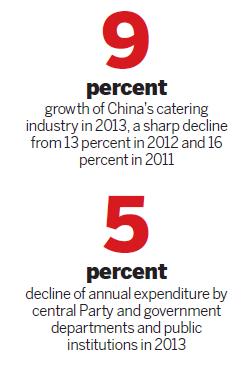It also forecast weak first-quarter revenue, mainly because of slowing Asian economies. The central government's austerity drive has been a major factor in this slowdown.

However, although the impact of the austerity drive readily became apparent in sectors such as catering, hotels, cigarettes, alcohol, luxury items and flowers, the impact on the consumer sector overall is not as easy to assess. First, there are no substantial studies or government statistics to indicate how heavily publicly funded activities account for overall consumption.
Second, while some consumption indexes have fallen or slowed their expansion rates, it's difficult to tell whether the decline can be attributed to the austerity campaign because the slowing private consumer sector might also have played a role.
For example, according to the China Cuisine Association, growth in China's catering industry slowed to 9 percent in 2013, a sharp decline from 13 percent in 2012 and 16 percent in 2011. The association said 2013 was the first year in 23 that growth had fallen below double digits.
Retail sales in China totaled 2.34 trillion yuan ($382 billion) in 2013, an increase of 11.5 percent from 2012. But while the figure was slightly lower than the 12 percent recorded in 2012, there's no way of knowing if the decline was a direct result of the austerity drive.
Wu Hui, an associate professor of governance at the CPC Central Committee Party School, said although publicly funded extravagance fueled the consumer sector in the days before the crackdown, the prosperity it created was "illusory" and had to be stopped.
Long-term benefits
Many Chinese scholars have argued that despite all the pain the thrift campaign has imposed on catering and related industries, the campaign will result in long-term economic benefits.
He Jianwu, an associate researcher with the Development Research Center of the State Council, said the austerity campaign has helped to pull the consumer market back onto a "normal" track. For too long, he said, an excess of publicly funded consumption had distorted the consumer market and inflated the prices of many products. For example, the price of Moutai, a luxury liquor brand often supplied at government banquets, has fallen by 30 percent compared with its peak, according to the Ministry of Commerce.
"In the long run, the campaign will help to raise household consumption," He said, adding that the campaign will also help to curb the waste of resources. In 2012, China imported 80.25 million metric tons of grain, equivalent to 13.6 percent of the country's total grain output that year. However, a striking amount of food was also wasted. Lower consumption will reduce the burden on resources, alleviate environmental degradation, and bolster the country's food security.
He said the campaign will improve government efficiency and result in greater benefits for businesses. After all, if officials spend less time at banquets, which often last for hours, they will have more time to deal with business-related matters, such as building and registration applications. Furthermore, the ban on government officials accepting lavish gifts and kickbacks means businesspeople can now spend less on gifts and more on investment, less time seeking guanxi, or connections, and more time focusing on their products.
An official with the Zhoushan government, who declined to be named, recalled the times when he drank too much at the endless banquets and was scolded by his wife. Once he was so drunk that he fell asleep on the doorstep of his own home.
"In the old days, I was personally averse to the banquets because they made me feel ill. But I had to attend because it was unthinkable not to. Now I feel much more relaxed. I can spend more time at my office or at home," he said.
But as the behavior of officials becomes more restrained, another question arises relating to incentives. The official admitted that although he and his peers now dare not accept gifts or attend banquets provided by businesspeople, neither are they interested in offering timely services for businesses.
"In the old days, officials might accelerate the approval procedure if they received gifts from enterprises, but now they dare not do that. Instead, they strictly follow the procedures, and that means it takes more time for businesspeople to get things done," he said.
